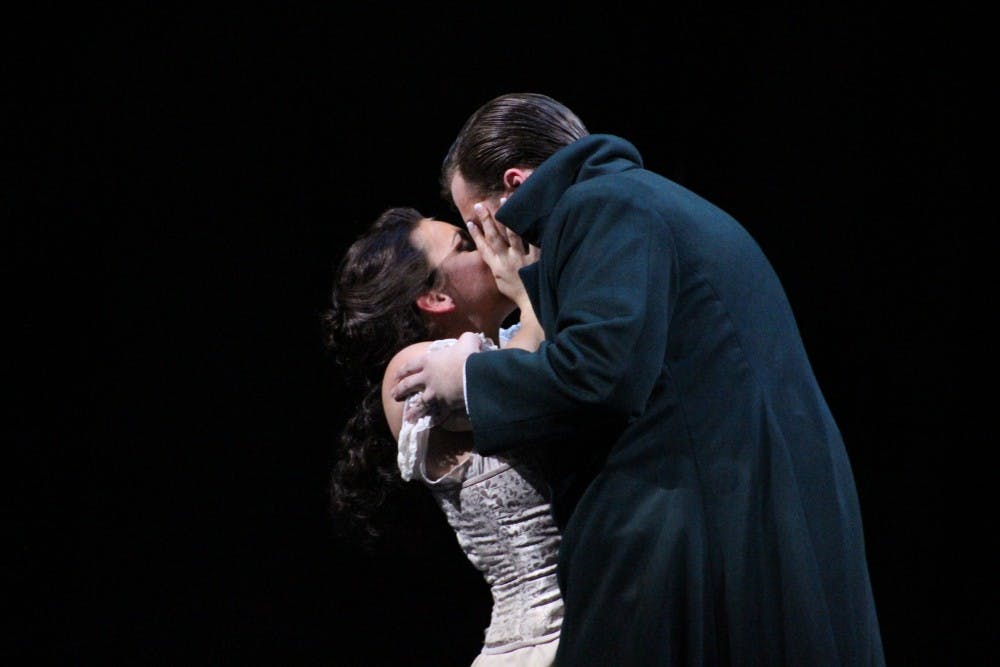Warring families and forbidden love clash in the gothic-Scottish terrain where IU Opera Theater’s production of composer Gaetano Donizetti’s “Lucia di Lammermoor" will play at the Musical Arts Center 7:30 p.m. on Feb. 23 and 24 and March 2 and 3.
This production is directed by Jose Maria Condemi and has sets and costumes by British designer Philip Witcomb. In 1835, Donizetti adapted “Lucia di Lammermoor” from Sir Walter Scott’s 1819 novel “The Bride of Lammermoor."
The opera revolves around Lucia of Lammermoor, who’s fallen in love with Edgardo of Ravenswood despite their respective tribes' centuries-long rivalry. Lucia’s brother, Enrico, goes to tremendous lengths to keep them apart, and his efforts wind up driving Lucia to despair and murder, culminating in a famous “mad scene” at the end of the opera.
Condemi sets his production in the late-19th century Victorian gothic era.
A select few scenes have been cut to improve flow and omit gratuitous repetition, said first year master’s student Rose-Antoinette Bellino, who will perform as Lucia on Saturday, Feb. 24th, and Friday, March 2nd.
Bellino said the role of Lucia is one of the largest and most challenging for sopranos in the repertoire.
“It’s one of the most difficult, mostly because of how it’s set for the voice,” she said. “It takes a voice that has the ability to move and be flexible with a very wide range, but at the same time it needs a voice that is able to sing more of the earth lines at the same time, which is sometimes a harder bill to come by. It’s as if the type of voice you need almost changes section to section.”
However, Bellino said she found the experience very rewarding. One of her favorite parts of the rehearsal is when the singers make positive progress and Condemi presses a “that was easy” button.
Condemi said he uses the button to loosen tension during rehearsal.
He said Witcomb’s sets play an important role on stage. Witcomb’s sets were previously seen in IU Opera Theater’s 2017 production “Rodelinda.”
“There’s something about the environment that lends itself to gothic horror, gothic ghost stories,” he said.
Condemi said the opera deals with themes of repression of communal values and the beginnings of feminism in the plight of Lucia. He said he also strives to bring out more realism in the characterizations to respond to 21st century tastes.
“Dramatic adherence and theatrical believability was not an important thing for the composer at the time,” Condemi said. “Fast forward to 2018, and we expect anything on stage today, even from that period, to make sense. We want to understand the motivations of the characters.”
Condemi, who regards a commitment to psychology and truth to be especially prominent in his production, said the performers have to clearly express the the psychology of the characters.
“They don’t just portray stereotypes, they portray human beings,” he said.
Bellino said it will be approachable for theater-goers less familiar with opera.
“This one is one of the more accessible operas, to be honest, because the action starts right at the get-go,” she said. “There aren’t too many plot turns or intricate details in this show that can be misinterpreted or confused.”
Condemi concurred on that point with Bellino.
Condemi said the opera is still relatable and compelling to watch today.
"We’ve all been in a situation where we’ve had to ask family members to give up their wishes for the sake of the well-being of the family," he said. "Hopefully if myself and the singers do a good job, that universal truth about the behavior of the characters resonates.”




